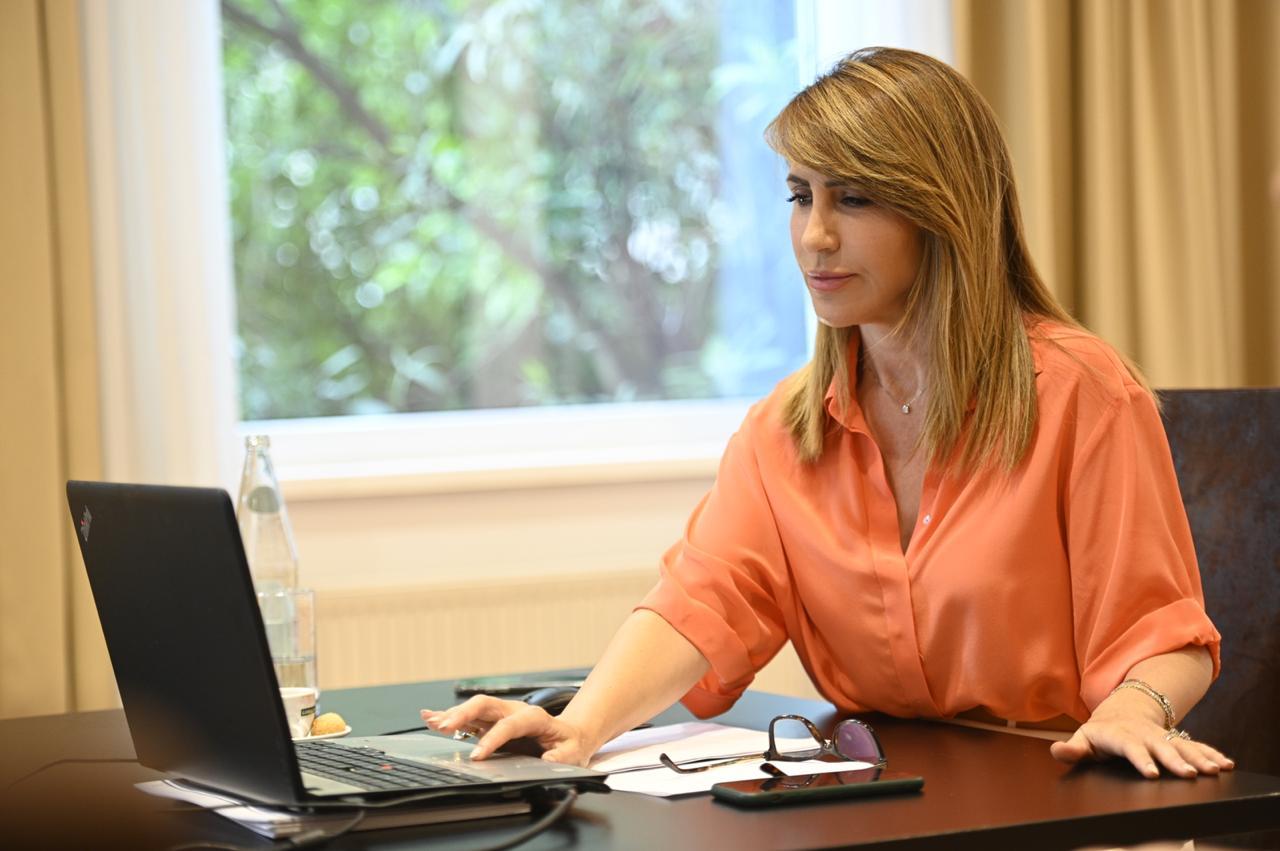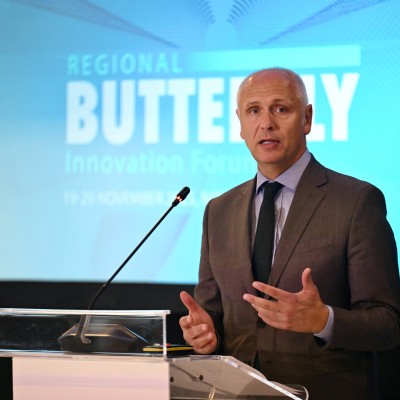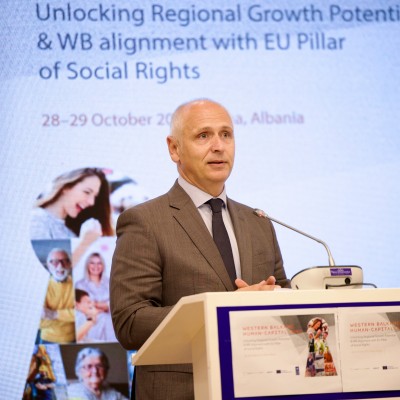Bregu: Cooperation is the only blueprint that holds the promise of ‘Stronger Together’
24 June 2020

Secretary General of the Regional Cooperation Council Majlinda Bregu presenting the findings of Balkan Barometer 2020 on a webinar held on 24 June 2020 (Photo: RCC/Armand Habazaj)
The Shape of the Things to Come - Presentation of Balkan Barometer 2020
Balkan Barometer 2020 reveals sentiments of citizens and businesses in the region, with a special addition conveying effects of the COVID-19 outbreak
Balkan Barometer 2020 presentation was going LIVE
Sarajevo – “The regional cooperation continues to grow in prominence with an overwhelming majority of citizens supportive of its role in improving the political, economic and security situation in their home economies - 77%, and 65% of them believes that what brings WB citizens together is more important than what separates us. The quick spread of COVID -19 was a grim reminder for all of us of how the disasters ignore borders and that cooperation is maybe the only blueprint that holds the promise of ‘Stronger Together’,” said Majlinda Bregu, Secretary General of the Regional Cooperation Council (RCC), ahead of the Balkan Barometer (BB2020) presentation taking place online today.
BB2020 INFOGRAPHICS COVID19 Impact Assessment Infographics
The special COVID19 Impact Assessment edition of BB2020, the RCC conducted in May 2020, provides a snap-shot analysis of the public and business opinion, which in a nutshell shows that 72% of Western Balkan citizens consider the pandemic outbreak as a high threat for their respective national economies. 68% of people are very much concerned about their own or their family members’ jobs and only one third of them are satisfied with how their Governments ensure that people do not lose their jobs.
“At the same time, the Balkan Barometer reveals that during the pandemic lockdown 65% of Western Balkans citizens confirm their appreciation of foreign assistance, where overwhelming part of it is from the EU. Majority, or 59% of WB citizens support EU membership, while 71% prefer EU as the most important trade partner of our region. Naturally so, as only for the post-pandemic recovery the EU has dedicated 3.3 billion Euro to the region.”
When asked who they consider to be most corrupt, 83% of Western Balkans citizen pointed to political parties, 80% to judiciary, 79% to customs, 76% to health care workers, and 76% to parliaments. Further on, BB2020 shows that brain-drain jumped points as a main concern of our citizens, from 0% in 2015 to 20% now. Staggering 71% of Western Balkans youth think about going to work abroad. This likely shows a strong correlation between lessening concerns over unemployment and rising anxieties over brain-drain as Western Balkans economies start to come to terms with exceptionally high outward migration of skilled labour.
60% of the business respondents have reduced operations due to the COVID-19 outbreak, while 21% either temporarily closed or completely closed their businesses. Only 5% have laid off staff permanently. On a positive note: whilst 37% of women are impatient to go back to normal work, 40% of young people were very happy to spend time with their families - most surprising finding.
“The Covid-19 will be a tipping point for the region. Channelling information and perceptions in favour of policy orientations might be the glue that will hold us together. It might persuade everybody that the narrative of domestic competence wouldn’t be wounded if accompanied by real measures of regional competence. That is how we may confidently ‘shape the things to come’,” concluded Bregu.
Introductory speakers at the BB2020 presentation webinar, beside RCC Secretary General Majlinda Bregu, are Olivér Várhelyi, Commissioner for Neighbourhood and Enlargement, and Ambassador Prof. Wolfgang Ischinger, Chairman of the Munich Security Conference, who will reflect on the BB findings from their own perspectives, EU integration and security situation, respectively.
Furthermore, panel discussion is including: Nikola Dimitrov, Minister of Foreign Affairs Republic of North Macedonia; Gent Cakaj, Acting Minister for Europe and Foreign Affairs of Albania; Genoveva Ruiz Calavera, Directorate-General for Neighbourhood and Enlargement Negotiations, European Commission; and Nenad Djurdjevic, Advisor to the President of the Managing Board Western Balkan Chamber Investment Forum. The panellists will discuss the findings of BB2020 and its Covid-19 edition and provide their take on overall (dis)satisfaction of businesses and citizens with the general situation in the region and how they were affected by the Corona outbreak.
More INFO (BB Database, publications, infographics, videos): www.rcc.int/balkanbarometer
***
Balkan Barometer is funded by the European Union. BB2020, the annual public and business opinion survey of the RCC, examines the perception and expectations on life and work, prevalent socio-economic and political trends & regional and European integration in the Western Balkans. The 2020 edition presents for the first time the perception and sentiments on COVID19 pandemic Impact Assessment.
The 2020 edition of the Balkan Barometer represents the next chapter in the steady evolution of the region’s foremost survey of public and business opinion. Launched as an attempt to measure impact of regional actions implemented under the South East Europe (SEE) 2020 Strategy, the Barometer is now firmly established as a reliable source of regional data widely employed and referenced by media, business, civil society and decision makers alike.





